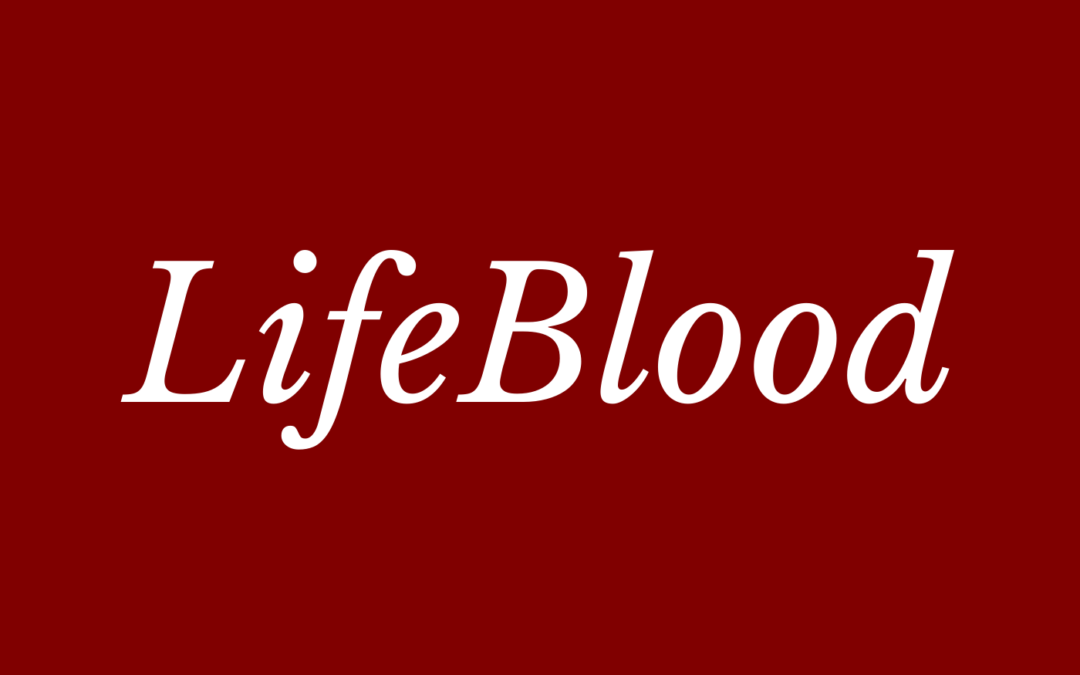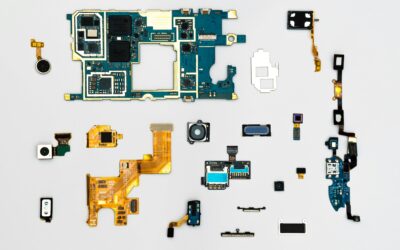Gold Royalty Companies with Fred Bell
Thinking about investing in gold, but want a diversified approach? Fred Bell shares his expertise into gold royalty companies and how they could be what you’re looking for!
Listen to us On
About the Episode
LifeBlood: We talked about gold royalty companies, gold versus crypto. The benefits of royalty companies to an investor, and how to diversify your portfolio with precious metals with Fred Bell, CEO of Elemental Royalties.
Listen to learn why investing in relationships can help get you where you want to go!
You can learn more about Frederick at ElementalRoyalties.com, Twitter and LinkedIn.
Thanks, as always for listening! If you got some value and enjoyed the show, please leave us a review wherever you listen and subscribe as well.
You can learn more about us at LifeBlood.Live, Twitter, LinkedIn, Instagram, YouTube and Facebook or you’d like to be a guest on the show, contact us at contact@LifeBlood.Live.

George Grombacher
Lifeblood Host

Fred Bell
Guest
Episode Transcript
Come on What will they play? This is George G. And the time is right. welcome today’s guest strong and powerful Frederick Bell. Fred, are you ready to do this?
Fred Bell 0:19
Absolutely. Judge.
george grombacher 0:20
All right, let’s let’s let’s go. Frederick is the CEO of elemental royalties. They are a gold focused royalty company. He’s been the recipient of young Rising Star Award by minds and money. I’m excited to have you on. Fred, tell us a little bit about your personal life more about your work and why you do what you do?
Fred Bell 0:39
Well, I suppose I’d probably define myself as a young mining professional. So I think almost the new generation coming into mining and I think there’s, there’s a perspective that everyone has on the mining industry from the outside. And I think that when you look at the future, mining as a whole is integral to whether it’s green energy revolution, wind turbines, electric cars, whatever it is, when we’re in the car, when we’re at home, when we’re making food. When we’re at work, we are using metals and minerals that have either been mined or farmed. And so I look, I studied history, I came into mining by accident, I think I fell in love with the industry. And fast forward. Fast forward a bit more than 10 years. And I set up a gold royalty company, and we listed him in Canada last year, in the middle of COVID. So that was an experience. So doing a roadshow from home, on the computer, in different time zones. But fundamentally, we’re we’re a gold royalty company. And and what we’re really doing is we’re giving people I think exposure or opportunity to get exposure to, to gold in a diversified vehicle. And and if you don’t know the royalty model, I think you should not just in mining, but it’s a lot of industries. And it is a really powerful business model. And the best way to describe it is maybe we’re here on a on a podcast. And if you think of your average favorite music song, the writer, the singer, the producers might get a royalty on that. And every time that song is listened to, they might get one cent or $1. And we are doing very similar. We get royalties on different gold projects around the world, Canada or Australia, wherever it is. And then that gives us a really diversified exposure to gold ongoing. And that’s some that’s really a quick intro to the company.
george grombacher 2:37
Nice. I appreciate that. So when you say you get a royalty, I totally understand that is that because you’ve made an agreed upon investment that will allow them to to grow their business? So you’re sort of becoming like a little shareholder?
Fred Bell 2:55
Yes, it’s it’s actually we have bought partly third party royalties. So that’s existing ones on assets. And if you look at the mining industry today, and it maybe goes back to that first point about how much the mining industry has changed, and mines nowadays might take 10 years to actually be developed and built. And by anyone’s investment horizon, that’s a long time. And there’s an awful lot of money and effort that people are putting in over years to develop this project. And so along the way, people often take some risk off the table. And maybe that is in the form of some shares, maybe that is in the form of a royalty. And so for us, it’s an opportunity to really, almost aggregate some of those together. And then we we offer a really diversified vehicle that is more diversified than the big mining companies. Because we don’t have to operate any assets. And we get exposure to top line revenue. So it is you don’t get operating cost inflation, you don’t have to contribute to ongoing costs. Once you own a royalty, you just get checks in the post every quarter every year for as long as that asset goes. And if it goes for 40 years, and you get paid for 40 years. So it is really good in that sense. And again, using the music analogy, I think if you had a you think of your favorite song and you had a royalty on it, you might be listening to a different song in five years time. And and so actually, if you took a royalty on 20 of your favorite songs and put them all together, that would be a more stable investment and give you more exposure generally. And that’s sort of in a very similar way what we’re doing with this with a gold royalty company.
george grombacher 4:36
Nice. Alright. And so there is there’s like an initial, for lack of a better term an IPO that I have as let’s say that I’m operating. I was gonna say GLG gold, but that would be inappropriate because that was a company. Those are my initials. I’m operating George grombacher Gold company. I own land in Canada. I think that there Gold there, I start digging, I start the mind, it’s gonna take me 10 years. But I’ve shown through my analysis that there is in fact gold under the ground and I say, You know what, I need to have some revenue coming in. I want just money coming in. And that’s where I would start or offer a royalty.
Fred Bell 5:21
Yeah, exactly. That’s often the case prospectors, sometimes landowners end up with a royalty. And for them, you might be at a time in your life, where you think that this this mine could take an awfully long time to be developed. And I’d like to buy a house in the next 10 years. Yeah, so maybe actually, I take a royalty on it and sell it to someone, and they can put it into a portfolio where it fits rather than me having 90% of my personal exposure to this asset. And, and that’s typically how a lot of royalties come about some are financings for the build the mind directly. So some are with the companies. But it is it is a pretty mixed, you know, they come they come around to all shapes and forms. We bought a royalty funnily enough from Colton breweries, which if you like your bear is Foster’s bit hand, they had it through some acquisitions in Australia. So I think we had a, we had a Foster’s to celebrate, when we close that deal. But mix world. Yeah, it’s it’s, I think it’s, it’s a really pertinent sort of gold as an investment. And, and again, I’m from I’m in my mid 30s, I’m in a generation where a lot of my friends invest in Bitcoin and crypto on their phone. And actually, it’s, it’s, you know, gold is, is an investment that provides diversification, away from individual currencies. And I think crucially, unlike Kryptos, and Bitcoins, you never, you never know, when those which is going to ultimately succeed. Gold has been around for millennia, it is accepted internationally. And you know, where other things might go up and down, over the course of months or years, you look at gold, and it has been a constant throughout history. And that’s not just individuals at Central Banks, it is actually in governments themselves. And so I think, particularly in sort of today’s environment, where there is a lot of money being printed, and a lot of that being created by governments, I think gold has a really crucial role to play. And, and that’s why I think, actually, if you can do it, not virus specific minor, in a specific country, where you have a lot of asset risk, a lot of country risk, if you can do it in a vehicle where you get some top line revenue, to multiple assets, it’s really diversified, but you get that leverage to all their exploration ongoing. That’s why it sort of works. And that’s really what attracted me to end up setting up a royalty company and being here today chatting with
george grombacher 7:53
you, thanks. No, I appreciate it. And that that certainly does make sense. So the the initial sale that that I make just kind of announced it, and people can say, hey, I have a royalty for sale. And people buy that, because I am theoretically speaking five years off, or eight years or nine years off from actually producing and then selling so making money does that royalty is is that of lesser value, versus a royalty of an existing going concern?
Fred Bell 8:26
Yes, yeah, of course. I mean, look, it’s it’s always a trade off between the size of the resource, the operator, the jurisdiction, whether it’s in production or not. And when we talked about long timeline nowadays, for environmental permitting, for social permitting, really, with the communities and building the mind, obviously, there is some pretty big hurdles to to get over. And some of those, there’s, there’s no, you know, it just takes time, you need to get people comfortable, you need to make sure you’ve done the proper risk assessments and feasibility studies. And so for that reason, producing royalties, I think, I’d call it the Holy Grail, because you’re getting exposure today to gold prices, in our case and your annual getting the exposure down the line through continuing exploration. So it’s, yeah, it works very much. I suppose. It works best when you have producing royalties, but then you can also have some development assets that might come in, in year two, year three, year four, year five, year six. So you’ve got that constant growth. And I think one of the really interesting things about royalty companies as a whole and this doesn’t just apply to mining, but the model is that you don’t operate any assets. And so you’re very, very lean management teams. And and the biggest mining royalty companies are 30 billion market cap and 3035 employees. So it’s sort of incredible when you get to that scale. And, and I think where we are, you know, a benefit we have is we can grow quite fast Save. We’ve sort of grown revenue 50% year on year since we started in 2017. And I think that that’s obviously harder to do when you’re bigger. But it’s some, it’s certainly it’s a good business model to be in.
george grombacher 10:12
Nice. Yeah, I appreciate that. So as, as a potential investor in a rut company I would be looking at, at who is managing and who is making this decision. So I’d be looking at you and say, Okay, how is how is Fred doing a, a great job at evaluating which of these royalties to be looking at and then buying to what you’re just talking about buying existing revenue generating, but then also looking at the future, so that, you know, 10 years from now, when some of these are no longer producing anymore, just because they ran out of gold, we have new ones coming online.
Fred Bell 10:49
Yeah, and I think this is something that, again, can probably broaden it outside of mining and apply generally, but I remember investing many years ago now at university, myself. And I, I always, always, always underestimated the people and the management. And, and now, the being on the other side of the fence and actually running a company, that’s always now the first thing I look at. I go on a company and I look at who’s involved in this, who’s on the board who’s a management, do they have a track record of success. And I think we’re fortunate in that two of our directors actually owned royalties, personally, both producing royalties. And I think both of them have sort of built billion dollar mining companies, and being involved in that. And, and we’ve got some, some really good technical experience in the DNA of elemental from when we started, and Richard and Peter, who, who I started this with, I’ve known Richard, for more than a decade now, both come from a technical background work for Western mining in Australia, which was one of Australia’s biggest companies. And I think that was crucial, because we can, as you say, we can find opportunities, but you need that gray haired technical experience. And you almost need those scars, from seeing things that have gone wrong, to inform your decision making going forwards. And so I think as we have grown, we’ve been able to attract better, we’ve got bigger institutional investors. But also we’ve really strengthened out the team, with people who have been there done it serially successful. And the great thing is, it’s not just their experience, but it’s also their contact base. Because a lot of these royalties, they come through network, they come through people, and I always think it’s a people business. So I’ve always thought that good people introduce you to other good people. And and then it becomes a really virtuous cycle, in terms of your network connections, and a lot of these opportunities ultimately do come through those those introductions and other people in the industry.
george grombacher 12:57
Nice, I appreciate that. So so how do I as as an investor participate? Am I do I need to be an accredited investor, as I’m talking and saying that I recognize that you are in in the UK, and that the stock is traded in Canada? But how? How does it all work?
Fred Bell 13:15
It some, I mean, look, I can, in the UK, we can buy shares now on on our mobile phone, if you’ve got an if you’ve got an investing platform, and I think if you’re in Canada, we’re listed on the TSX V, with the symbol le e le, and in the US were listed on the OTC with the symbol le MF. And, and nowadays, I think if you if you have a investing platform, generally I would think that anywhere from Australia to Europe, to South America, you can probably go on your go on your phone, go on your laptop, and you can actually look up the company and and I think most places participate. I always think that technology, the world is getting smaller and smaller. And it’s getting easier every month to talk to people and engage with people and even you know, in this example, invest in companies on the other side of the world.
george grombacher 14:14
Yeah, yeah, I couldn’t agree more. It is it is an amazing thing. And to learn about things that you never really knew a lot about, like royalty companies and investing in gold this way. So when when when I go and buy shares, then y’all issue a dividend. Is that how it works out?
Fred Bell 14:34
Yes, so we actually we paid a dividend when we started the company privately. So we started in 2017. We listed last year in 2020. We actually stopped paying a dividend when we listed partly because I think we we sort of doubled the size of the company twice last year. And so while our view was at this stage growth is is more important for us getting critical mass and scale. Because what you really want as a royalty company is is diversification, I think, and that’s really helpful. So our view is a dividend is probably is probably an efficient return of capital as a route. And maybe that’s something that starts to come in, in 2022. As as one of our bigger royalties or our biggest royalty, sort of let’s just come on stream recently.
george grombacher 15:27
So you are viewing yourself more as a growth company?
Fred Bell 15:31
Yeah, definitely. I mean, look, we have, I think we started this in 2017, at a roughly 27 cent equivalent share price, and we’re probably 141 50. At the moment. We’ve increased share price every time, I think we have increased revenue. Every every year, since we’ve started and up until last year, when full year results were announced, I think we had doubled revenue year on year. So it’s definitely a growth stock. And in that sense, as you would expect with a in some regards as a startup royalty company in 2017. And this was literally just an idea jotted down on a piece of paper then. So I think it’s the natural evolution is that as we grow, and as a portfolio builds out, dividend is one of those items on the list that that starts to make more sense.
george grombacher 16:24
Got it makes perfect sense to me. Well, Fred, the people are ready for your difference making tip, what do you have for them?
Fred Bell 16:32
I think it actually I’ll go back to something that that came about through a question that you asked today. And it’s about people. And if I, whether it’s in, in work or or in personal life, I think I’m I think working with associating with good people, I have learned over the course of my career makes a huge difference. And, and I think sometimes you even see it in sports teams, where you where you get a top manager and a top coach, and they can get more out of the people around them. And you get in a really positive environment. So I think if I could go back, go back to my younger self. I would say look out for the really successful driven, honest people with with a good ethics and AI income, work with them, get to know them learn from them. So that would be my that would be my top tip.
george grombacher 17:28
Well, I think that that is great stuff that definitely gets Come on. Come on. Yeah, it is all about the people and like it. Will Frederick, thank you so much for coming on. Where can people learn more about you? And how can they engage with you and elemental royalties?
Fred Bell 17:43
Easiest way is always initially probably our website, www dot elemental royalties.com. And we always say that we’re phone lines are open, if anyone ever calls the office and funnily enough, we rarely get calls from investors. But it definitely, people do. We’re always very receptive and happy to talk through a bit about the company and the history and the plans going forward as well.
george grombacher 18:08
Love it. Well, if you enjoyed this as much as I did, she’ll read your appreciation and share to the show the friend who also appreciates good ideas, go to elemental royalties.com and find them however you like to purchase your stocks and see if it’s a good fit for you. Thanks. Good, Fred.
Fred Bell 18:28
Thanks, Josh.
george grombacher 18:29
And until next time, keep fighting the good fight as we’re all in this together.
Transcribed by https://otter.ai
More Episodes
Beyond the Bank Balance: Cultivating a Soulful Relationship with Money
You don’t need to be a Wall Street shark or a personal finance guru to develop a healthy relationship with money. In fact, most of us start with little more than a jumble of beliefs and habits passed down from our families. But if you’ve ever found yourself stressed...
How Using AI Can Help You Gain Clarity Into Your Financial Future
In today's fast-paced, data-driven world, achieving financial clarity can feel like an overwhelming task. With numerous financial decisions to make—from budgeting and investing to retirement planning and debt management—it's easy to feel lost in the complexity of it...
How AI Can Help Improve Your Personal Finances
1. Smarter Budgeting and Expense Tracking AI-powered tools like Mint, You Need a Budget (YNAB), and PocketGuard can automatically categorize your expenses, track your spending in real time, and even alert you when you’re about to exceed your budget. These tools...
Trust and Confidentiality When Using AI as Your Financial Coach: Safeguarding Your Sensitive Data
In the digital age, artificial intelligence (AI) has revolutionized many aspects of our lives, including personal finance. AI-powered financial tools have become a go-to resource for budgeting, investing, debt management, and even retirement planning. But as more...
How AI Can Be Your Personal Financial Coach: Unlocking the Future of Financial Success
In today’s fast-paced world, managing your finances can feel overwhelming. With so many options for saving, investing, and budgeting, it can be hard to know where to start or how to stay on track. Fortunately, advances in technology—specifically Artificial...
How Technology and AI Are Benefiting Investors and Consumers in Securing Their Personal Financial Futures
In recent years, the rise of technology and Artificial Intelligence (AI) has profoundly transformed the financial landscape. These advancements have empowered investors and consumers to make more informed, efficient, and personalized decisions about their financial...
10 Things New Parents Should Be Thinking About Regarding Their Personal Finances
Becoming a parent is one of the most joyful and transformative experiences in life. However, it also brings new financial responsibilities and challenges. If you’re a new parent or expecting, it’s crucial to plan ahead to ensure your family’s financial security. Here...
10 Things Newlyweds Should Be Thinking About Regarding Their Personal Finances
Marriage marks a new chapter filled with excitement and partnership. While love may be the foundation, financial harmony is key to building a stable and happy life together. To set yourselves up for success, here are 10 essential financial topics that every newlywed...
Financial Tips for New Parents: Building Stability and Security for Your Growing Family
Becoming a parent is one of life’s most rewarding experiences, but it also brings significant financial challenges. From diapers to daycare, the costs add up quickly. Whether you’re a first-time parent or adding to your family, managing finances wisely is crucial for...
Join the show.
Interested in being on the show? Tell me a little bit more about you and what you’d like to talk about!














